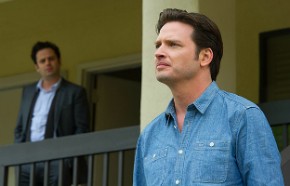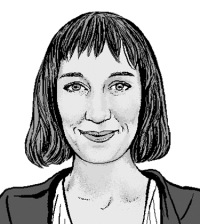Out of sync

Unlike any other television series I’ve watched, Rectify (SundanceTV) moves slowly and carefully and is as much about a person’s inner life as it is about external circumstances. Its exploration of moral and spiritual landscapes suggests new and unexpected directions for television.
In the first season, Daniel Holden (Aden Young) is released from Georgia’s death row after serving 19 years for the rape and murder of his high school girlfriend, Hannah. New DNA evidence has vacated his sentence, but it has not fully exonerated him. He returns to his hometown and to the people who were devastated by the murder and his conviction. Although questions of guilt hover in the background, the show is not about whether Daniel committed the crime, and by the end of the third season (a fourth and final season begins later this year), it’s not clear that viewers will ever know what happened to Hannah. Instead the show’s central question is: What in this complex community—and in Daniel himself—can be made right?
Read our latest issue or browse back issues.
Blinking into the sun on the day of his release, Daniel looks more like a cornered animal than a freed soul. He spends most of the first season staring out windows, trapped between memories of prison (which are shown in flashback) and his sudden freedom.
Daniel is out of sync with the world after 19 years. He disappeared into prison before cell phones, before the Internet explosion, and before the recession hit his hometown hard. Even his speech patterns—deliberate and uncertain—seem old-fashioned. By most measures, he has not grown up. He’s never held a job, owned a piece of property, or sustained an adult relationship.
But if we measure development by moral wisdom and self-knowledge, he is the most grown-up person in the series. He quotes Aquinas and Derrida and dispenses existential wisdom to his evangelical sister-in-law without sounding preachy or condescending. He delights in the mundane and revives our appreciation of an early morning doughnut run or the taste of a panini. He moves through the small town of Paulie, Georgia, as if he’s a spirit from another time, unsettling everyone he meets, and unable to settle himself.
If Daniel is exceptionally attuned to the notes of inner life, he is tone deaf to the harmonies of community. As he says midway through the first season, the sheer possibilities for human relationships—who might know whom or say what or even just show up—boggle his mind after having lived two decades in isolation under the threat of death. Daniel craves community, but its complexities overwhelm him.
His return widens cracks that have been forming for years in the lives of his family and friends, Hannah’s family, and the rest of the small town. His reappearance tests marriages, ruins friendships, and derails careers. The show spares no one—all are subjected to the same penetrating gaze; there are no heroes or villains.
Critics have compared the series to Flannery O’Connor’s fiction because of its southern setting and its moral tone. But Rectify has one advantage over O’Connor: time. The show moves at a glacial pace—the entire first season covers six days and the first three seasons cover only a few months. A glance or gesture can reflect decades of resentment, confusion, and love, and whole scenes pass with only a few words of dialogue.
Like O’Connor’s fiction, Rectify’s slow burn reveals the viewer as well as the characters in the story. At several points, I felt physically uncomfortable. I wanted some relief from the piercing gaze that seemed to reach through the heart of the characters into my own heart. This might not sound like a recommendation, but it is. Rectify has the potential for revealing and nurturing our spiritual and moral lives.







